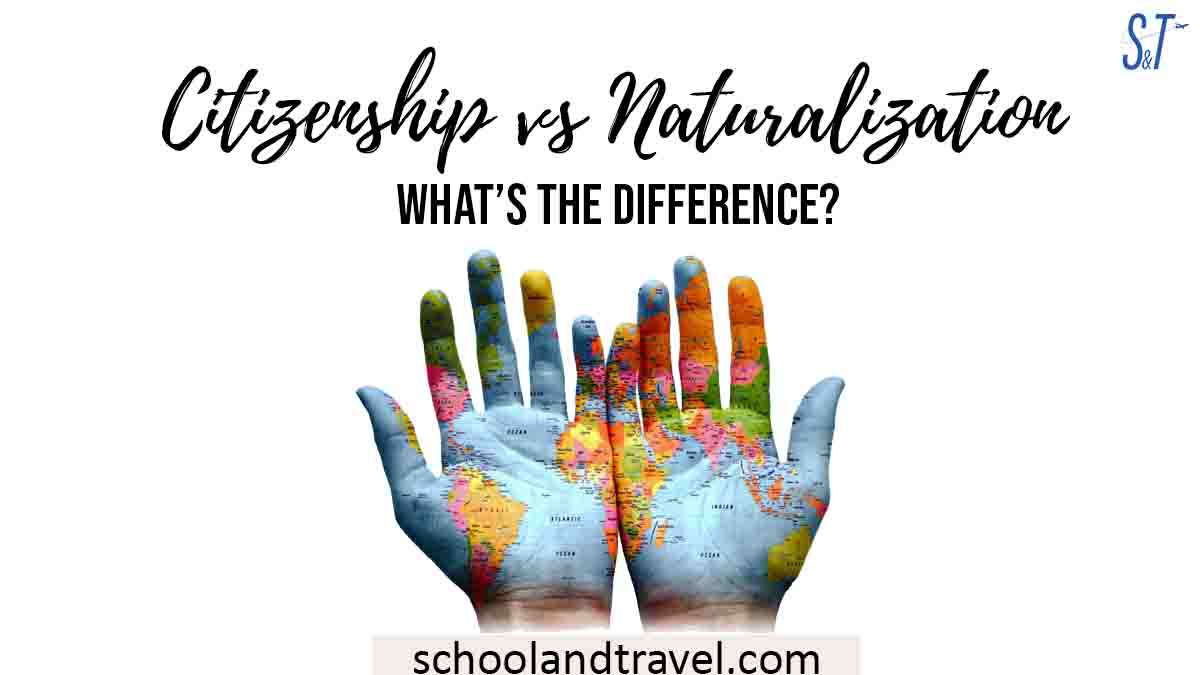Citizenship and Naturalization are two words that are commonly used when trying to describe the various kinds of people that are allowed certain privileges in a country.
In every geographic location, certain rights and privileges are reserved for certain people living in that particular geographic location.
These set of people have some inalienable rights bestowed on them for various reasons.
While some got this right because they were born to the right parents, others due to the length of years spent in a country.
However, there has always been an existing confusion regarding the words mentioned above, citizenship and naturalization. Hence in this article, we intend to put that confusion to rest.
Citizenship vs Naturalization
Citizenship
According to Wikipedia, citizenship is simply a relationship between an individual and a state to which the individual owes allegiance and, in turn, is entitled to its protection.
For the case of this article, it is important to note that citizenship is usually obtained by having parents from a certain country.
Naturalisation
Also, Wikipedia defines naturalisation as the legal act or process by which a non-citizen of a country may acquire citizenship or nationality of that country.
This process is usually either automatic or activated. It is automatic when the naturalization is based on certain criteria put in place by a state and requires no effort from the individual.
It is activated when the process is brought into play by application made by an individual to relevant authorities.
The process of Naturalisation varies from place to place.
However, the oath of allegiance and fulfilling some basic requirements are constant features across the various countries that permit this process.
This process serves as a bedrock of multi-citizenship in the world today.
Difference between Citizenship and Naturalisation
The first dissimilarity lies in the certificate possessed by an individual.
Suppose you are a citizen of the state; it can be proved if the individual possesses either a citizenship certificate or a certificate of naturalisation. With the former being for those who are citizens by their parents being citizens.
If a child is born in another country, not the US, but by US citizens, the child is eligible and should obtain a citizenship certificate.
The latter involves those who went through a process and fulfilled the requirements for naturalisation.
This process is monitored and executed by the United States Citizenship and Immigration Service, USCIS, a body under the homeland security department.
It is important to understand that for a foreign national to naturalise; the person must be over a certain age, usually 18yrs in the US.
Read this: OPT to Green Card (Everything you need to know)
Citizenship vs Naturalization
Requirements For Naturalisation
- Be a US permanent resident.
- Be at least 18 years of age.
- Meet the requirements for good moral character.
- Be present in the US for a certain period of time usually five years, or three years if you are married to a US citizen.
Naturalisation Process
Many people try to naturalise or undertake the process of Naturalisation after they are convinced they have satisfied certain requirements, but what are the processes involved?
Like major processes around the world, the naturalisation process involves paperwork. Documents such as the N-400 form and a green card should already be in the applicant’s hands.
The applicant is expected to have satisfied the length of residence, continuous residence, language proficiency etc.
After ensuring the required documents are in hand, and the requirements for naturalisation have been fulfilled, the applicant is usually given interviews.
Then a test on a series of things basically on civics and language is conducted to ensure the applicant is grounded on the country’s language and other aspects.
On fulfilment of the processes mentioned above, the applicant is then approved. An Oath of Allegiance to America in a naturalisation ceremony follows.
Ultimately, the applicant is then given a naturalisation certificate that proves the individual US citizenship.
Citizenship vs Naturalization
Do Naturalisation and Citizenship Certificate Offer Different Rights
One of the most frequently asked questions among individuals or intending naturalisation applicants is, “Do I have the same right as a normal US citizen?”
It is quite important to establish that individuals with either of these two certificates have equal/same rights, including;
- the right to a US passport,
- the right to vote, and all other civil rights of a US citizen.
Also, to affirm their strong position, they cannot be deported and annul their citizenship. This is to say that both naturalisation and citizenship are the same, just different processes.
Read this: How many Colleges should I apply to? Quick answer
Conclusion
Naturalisation and Citizenship are quite the same thing. Simply put, Naturalisation is just another type of citizenship with the same end game.
The only difference between them is the path to obtaining the two certificates.
While one is straightforward and gotten naturally without any work, the other is rather stressful and requires a level of work.
Awesome one; I hope this article answered your question.
Share this Information.
Related articles:
- 8 Most Expensive Colleges In the World in 2021-2022 (Expert Research)
 Do you wonder what the most expensive colleges in the world will look like? The top-notch learning system, the state of the art learning environment and the qualified lecturers? Then, this article is for…
Do you wonder what the most expensive colleges in the world will look like? The top-notch learning system, the state of the art learning environment and the qualified lecturers? Then, this article is for… - How to skip a grade (Expert tips, Best time, five Alternatives, Best Option?)
 Skipping a grade is a form of academic acceleration set aside for students with cognitive abilities, which allows them to skip the entire curriculum of one or two years. Parents of brilliant children are…
Skipping a grade is a form of academic acceleration set aside for students with cognitive abilities, which allows them to skip the entire curriculum of one or two years. Parents of brilliant children are… - H4 To F1 (Meaning, How-to, benefits)
 The admission process into many universities proves to be quite tedious. Most of the issues with this course of action stem from legal actions and repercussions. The change from H4 to F1 is one…
The admission process into many universities proves to be quite tedious. Most of the issues with this course of action stem from legal actions and repercussions. The change from H4 to F1 is one… - How Long Does It Take To Learn C++? (Quick answer)
 Do you want to learn C++? but feel that it will take the whole world? Don’t worry, this article will explain “How long it takes to learn C++“, “Difficulty in C++” and how to…
Do you want to learn C++? but feel that it will take the whole world? Don’t worry, this article will explain “How long it takes to learn C++“, “Difficulty in C++” and how to… - 5+ Free Doctorate Degree in Theology Online
 Are you looking for Free Doctorate Degree in Theology Online to expand your experience? Then this article is for you. People have various desires to study different things, although some people’s steady choice may…
Are you looking for Free Doctorate Degree in Theology Online to expand your experience? Then this article is for you. People have various desires to study different things, although some people’s steady choice may…





